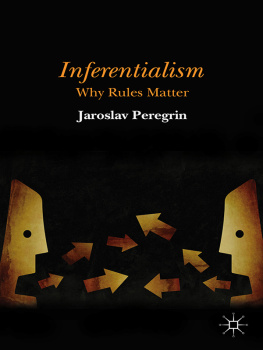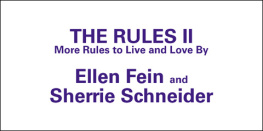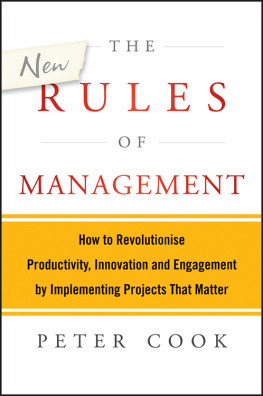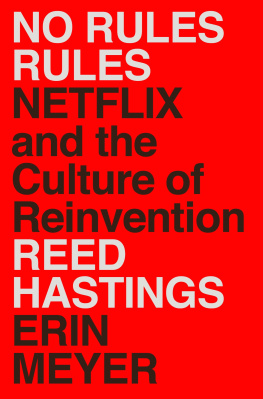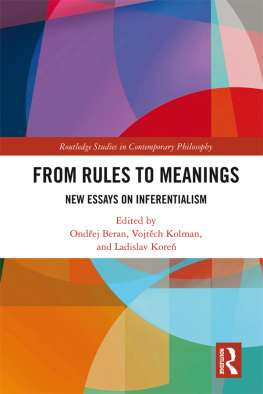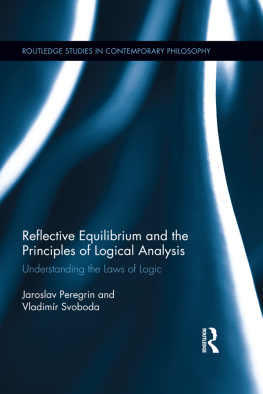Peregrin - Inferentialism: why rules matter
Here you can read online Peregrin - Inferentialism: why rules matter full text of the book (entire story) in english for free. Download pdf and epub, get meaning, cover and reviews about this ebook. City: Houndmills;Basingstoke;Hampshire;New York, year: 2014, publisher: Palgrave Macmillan, genre: Romance novel. Description of the work, (preface) as well as reviews are available. Best literature library LitArk.com created for fans of good reading and offers a wide selection of genres:
Romance novel
Science fiction
Adventure
Detective
Science
History
Home and family
Prose
Art
Politics
Computer
Non-fiction
Religion
Business
Children
Humor
Choose a favorite category and find really read worthwhile books. Enjoy immersion in the world of imagination, feel the emotions of the characters or learn something new for yourself, make an fascinating discovery.
- Book:Inferentialism: why rules matter
- Author:
- Publisher:Palgrave Macmillan
- Genre:
- Year:2014
- City:Houndmills;Basingstoke;Hampshire;New York
- Rating:3 / 5
- Favourites:Add to favourites
- Your mark:
- 60
- 1
- 2
- 3
- 4
- 5
Inferentialism: why rules matter: summary, description and annotation
We offer to read an annotation, description, summary or preface (depends on what the author of the book "Inferentialism: why rules matter" wrote himself). If you haven't found the necessary information about the book — write in the comments, we will try to find it.
Inferentialism: why rules matter — read online for free the complete book (whole text) full work
Below is the text of the book, divided by pages. System saving the place of the last page read, allows you to conveniently read the book "Inferentialism: why rules matter" online for free, without having to search again every time where you left off. Put a bookmark, and you can go to the page where you finished reading at any time.
Font size:
Interval:
Bookmark:
Inferentialism
Also by Jaroslav Peregrin
DOING WORLDS WITH WORDS
MEANING AND STRUCTURE
Inferentialism
Why Rules Matter
Jaroslav Peregrin
Academy of Sciences of the Czech Republic, Prague


Jaroslav Peregrin 2014
All rights reserved. No reproduction, copy or transmission of this publication may be made without written permission.
No portion of this publication may be reproduced, copied or transmitted save with written permission or in accordance with the provisions of the Copyright, Designs and Patents Act 1988, or under the terms of any licence permitting limited copying issued by the Copyright Licensing Agency, Saffron House, 610 Kirby Street, London EC1N 8TS.
Any person who does any unauthorized act in relation to this publication may be liable to criminal prosecution and civil claims for damages.
The author has asserted his right to be identified as the author of this work in accordance with the Copyright, Designs and Patents Act 1988.
First published 2014 by
PALGRAVE MACMILLAN
Palgrave Macmillan in the UK is an imprint of Macmillan Publishers Limited, registered in England, company number 785998, of Houndmills, Basingstoke, Hampshire RG21 6XS.
Palgrave Macmillan in the US is a division of St Martins Press LLC, 175 Fifth Avenue, New York, NY 10010.
Palgrave Macmillan is the global academic imprint of the above companies and has companies and representatives throughout the world.
Palgrave and Macmillan are registered trademarks in the United States, the United Kingdom, Europe and other countries.
ISBN: 9781137452955
This book is printed on paper suitable for recycling and made from fully managed and sustained forest sources. Logging, pulping and manufacturing processes are expected to conform to the environmental regulations of the country of origin.
A catalogue record for this book is available from the British Library.
Library of Congress Cataloging-in-Publication Data
Peregrin, Jaroslav.
Inferentialism : why rules matter / Jaroslav Peregrin, Academy of Sciences of the Czech Republic, Prague.
pages cm
Includes bibliographical references.
ISBN 9781137452955
1. Meaning (Philosophy) 2. Semantics (Philosophy) 3. Language and languages Philosophy. 4. Inference. I. Title.
B105.M4P465 2014
1219.68dc23 2014021108
Contents
Acknowledgments
This book is a result of many years of my work on the topic, and there are many people to whom I am grateful for various kinds of critical comments and other impulses that I have projected into the final version of this book. My colleagues, who helped me directly with fine-tuning the text and to whom I am especially grateful, because without their critical comments the book would hardly have reached fruition, are Vladimr Svoboda, Vt Punoch, Radek Ocelk, and Pavel Arazim. Others who have given me valuable comments or criticisms either directly regarding the manuscript, or more generally concerning my ideas concerning inferentialism, are Ondej Beran, Bob Brandom, Christopher Gauker, Gary Kemp, Ladislav Kore, Tom Marvan, Barbara Partee, Pirmin Stekeler-Weithofer, Ken Turner, and Michael Williams. I am also grateful to Clare Wille and Petra Ivaniov who helped me with the linguistic and formal side of the book. The work on this final version of the book was sponsored by Research Grant No. 1320785S of the Czech Science Foundation.
Inferentialism: State of Play
1.1 What is meaning?
We may say, and we often do say, that what makes the difference between a word and a kind of sound that is not a word is that the former has meaning. Yet what does this mean? Thousands of books and articles have been written about the nature of meaning and I have no intention to survey them all here (needless to say, this would not be a humanly accomplishable task). For our present purposes it suffices to note that despite the immense efforts that have been put into these investigations no general agreement about the nature of meaning has yet been reached.
The question regarding the nature of linguistic meaning is approached in multifarious ways. The first crossroad is opened up by the question of whether the phrasing has meaning should be taken at face value, as expressing a relation between the word and some preexisting entity called meaning. Many philosophers have taken this for granted and have not seen it as disputable. A word, it is often claimed, stands for or represents, or expresses its meaning, and the reason it can do so is that we humans are simply symbol-mongerers: we have the peculiar ability to let one thing stand for another.
there are reasons to be skeptical about the prospects of fleshing out such a theory in a non-mysterious way.
These quick glosses, of course, are not to be taken as serious criticism, their purpose being only to remind the reader that no such approach has gained general acceptance as an explication of the concept of meaning, and that an effort to look elsewhere for another, more plausible explanation of meaningfulness is understandable. (Inferentialism, as presented in this book, is often thought to be a counterintuitive doctrine, so it warrants keeping in mind the problems plaguing rival conceptions of meaning to see that they face obstacles the circumvention of which might outweigh some amount of prima facie counterintuitiveness.)
But, of course, we need not take the meaning talk at face value; we could take it instead as metaphoric talk about some properties of words. Maybe what is characteristic of words as contrasted with sounds that are not words is not, or is not literally, that they stand for something, or express it, or represent it, but rather that they have some peculiar property. (The fact that we tend to talk about having a property as about being related to some reification of the property is not in itself mysterious, for it is something we do as a matter of course: we do not hesitate to speak about things having height, color, etc.)
One of such explanations, the popularity of which has been on the increase over recent decades (especially thanks to the impact of the legacy of the later Wittgenstein), is that what characterizes a word is the way it is employed within our language games. According to this view, what we call meaning is, in fact, a reification of use. But the trouble is that all kinds of things around us have uses, and yet it seems that to be meaningful as a linguistic expression is something very different from being used, say, as a hammer. Could the difference consist merely in the complexity of the respective uses?
One alternative way of conceiving the difference is to distinguish between items like hammers, which merely have uses, and items like words, which have roles, where a role in the sense entertained here is something that is conferred on an item by rules. Here is where the underlying idea can be elucidated by comparing words with chess pieces (a comparison frequently used in this book): just as to make a piece of wood (or, for that matter, whatever substance) into a rook it is enough to subordinate it to the rules of chess, what makes a type of sound into an expression meaning thus and so are again certain rules rules constitutive of our language games.
It seems to me that this opens up a non-mysterious way to explain meaning (chess does not seem to be a mystery!), and because such ways are in short supply, it is a view we might want to take seriously. Hence the idea is that what makes linguistic meaningfulness (aka having meaning) categorically different from other kinds of usefulnesses are the
Next pageFont size:
Interval:
Bookmark:
Similar books «Inferentialism: why rules matter»
Look at similar books to Inferentialism: why rules matter. We have selected literature similar in name and meaning in the hope of providing readers with more options to find new, interesting, not yet read works.
Discussion, reviews of the book Inferentialism: why rules matter and just readers' own opinions. Leave your comments, write what you think about the work, its meaning or the main characters. Specify what exactly you liked and what you didn't like, and why you think so.

